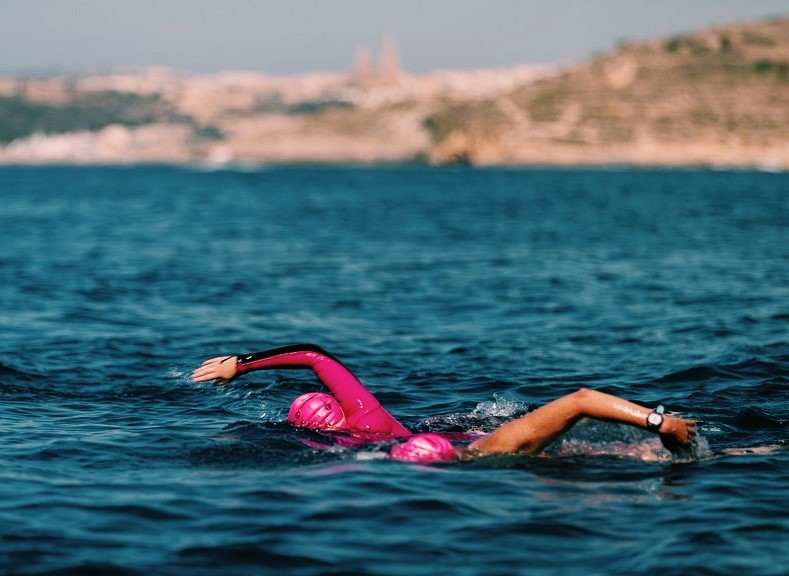We all want to limit the impact we have on the animals we swim with, and their habitats. It isn't always obvious what course of action we can take. When it comes to choosing products, what should we look for? Are there brands we should trust before others? In this blog, we focus on picking out more environmentally friendly sun protection - with a few reef-friendly recommendations thrown in by our trusty SwimTrekkers...
Sunscreen might not be the first thing we think of as being potentially harmful. The common habit is to lather up without a second thought – the idea being that the more of it we use the safer we'll be. In fact, a lot of the sunscreen we’re sold causes considerable damage to coral reefs. Vast and immense as they are, the world’s oceans are filled with different chemicals, including personal care products that seep into the water from our bodies.
Scientific estimates (put forward in 2015) suggest that roughly 14,000 tons of sunscreen alone is deposited onto coral reefs each year. While global warming plays an obvious role in the loss of coral reefs, this kind of chemical pollution is also a massive contributor to the decline of biodiversity in our open waters. The question we have to ask ourselves is: what's in the sunscreen we've been buying all these years?

What Does Reef-Friendly Mean?
There are chemicals within the formula of certain sunscreens, like oxybenzone and octinoxate, which are harmful to coral. These chemicals absorb harmful UV rays, which is why they are so widely used in sunscreen. However, they are harmful to the environments we love to swim in! Oxybenzone, for example, is an endocrine disruptor and causes the deformation of young coral, as well as coral bleaching, which transforms colourful gardens into plains of withered white coral.
Usually, coral shares a symbiotic relationship with the algae they house – algae absorbs sunlight and in turn is able to photosynthesise, supplying nutrients that feed coral. Algae is also responsible for those fantastic colour variations we see among coral gardens. Conversely, stressed coral, weakened by foreign chemicals, or an abrupt rise in sea temperature (or the over acidification of seawater), is likely to expel the algae and transform into a pale husk, deprived of its main source of food. Luckily, this process can be reversible and algae is able to return after being expelled – it just depends how long and severe the period of stress has been. If the bleaching is prolonged, coral will starve. So, it is absolutely essential that the skincare products we choose do not accelerate, or lengthen this process.

One thing to keep in mind, when we stock up on sunscreen, is the inclusion of harmful ingredients, listed on the bottles we pick up. Preservatives can also be toxic. For example, parabens, like the commonly found methyl paraben, or butyl paraben, were originally used to anesthetise fish. They are very harmful to the resident wildlife where you swim!
Sometimes, the recombinant chemical fragrance of sunscreen is also found in the fish we eat, having accumulated in organisms that spend their lives in a worsening chemical soup. We can make a huge difference, simply by paying more attention to the products we lather on ourselves. Another thing to consider, when weighing up the benefits of a higher SPF, is the fact that a higher SPF is often more harmful to the environment, due to it containing a higher percentage of chemicals. It is important to check the ingredients of sunscreen and search for key phrases, such as: 'reef-friendly', 'no oxybenzone', 'cruelty-free' or 'no parabens'...

Of course, there are also alternative forms of sun protection that are highly effective and will also minimise your impact on the marine environment. The best and most reliable alternative, when it comes to protecting your skin from sun damage, is a healthy collection of protective sun wear and accessories. Or, for swimmers spending long stints in the water, rash vests, t-shirts and wetsuits are ideal for keeping you safe. A combination of both reef-friendly lotion and appropriate clothing is guaranteed to protect your skin, without causing needless harm to coral reefs. And it's a great way to effectively protect yourself as well, especially during longer swims!
Harmful Ingredients to Look Out For?
Oxybenzone (Benzophenone-3), Octinoxate (Octy-Methoxycinnamate), PABA, Homosalate, Octocrylene, Octisalate, Avobenzone...
Alternative Sun Protection
Clothing (rash vests, sun hats...), Zinc Sticks, Coconut Oil (and other plant oils), Aloe Vera...
What Do Other SwimTrekkers Use?
Still unsure which options suit you best? Stuck for the right sunscreen brands to start with? Here are some great recommendations from the wider SwimTrek community:
"I use Stream 2 Sea if I have to use sun cream - clothing is a better alternative (Their leave in conditioner is amazing as a separate note!)" - Jenny O'Farrell
"Zinka have reef safe zinc face sticks in fun colours there's also a brand called Shade that makes reef safe suncream in tins..." - Tasmin Powell

"Only ever zinc - Sun Butter is a product apparently reef-friendly, but haven't tried it..." - Suzette Sutton
"Coola is my favorite!" - Lisa Nirell
"Rash vest, triathlon shorts with zinc on exposed skin are my favourite sun protection tips." - Pauline Tester
"Blue Lizard!!" - Cindy Halim

To find out more about SwimTrek's environmental objectives, please visit our Sustainable Travel page. If you have any queries or contributions to this article, please don’t hesitate to email us at: marketing@swimtrek.com












@malia
Have been using stream2sea for the longest and I must say it is a very good reef safe sunscreen.
https://stream2sea.com/product-category/hair/
posted 4 months ago